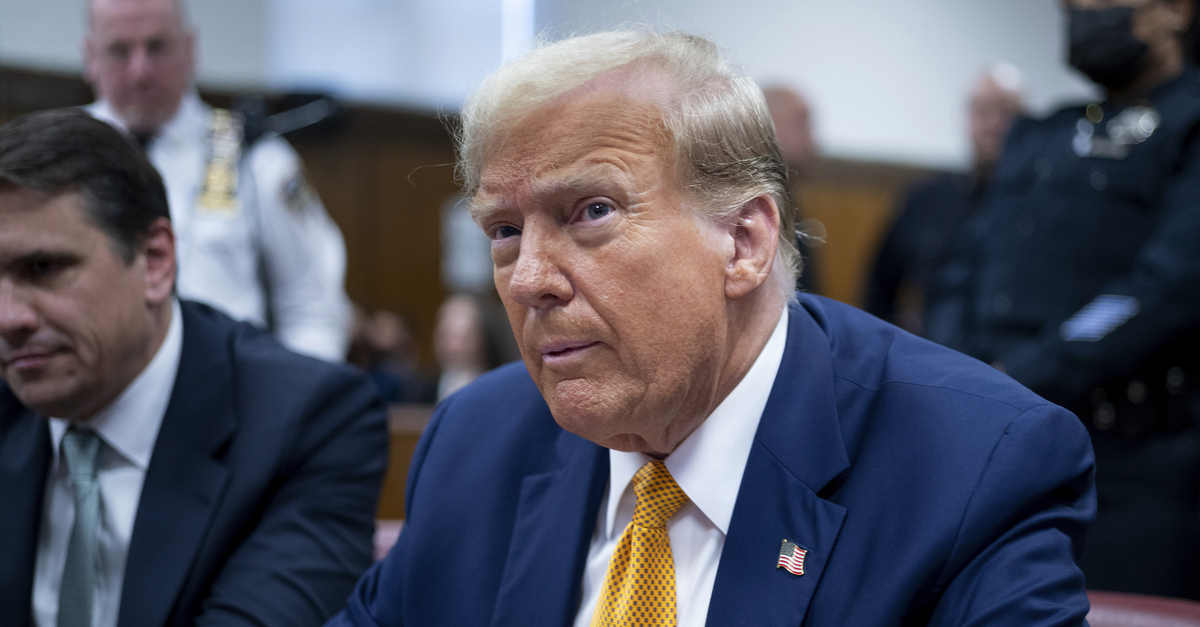
Former President Donald Trump waits for the start of proceedings in his trial at Manhattan criminal court, Tuesday, May 14, 2024, in New York. (AP Photo/Craig Ruttle, Pool)
Attorneys for former President Donald Trump have failed to convince a New York appeals court to lift the gag order imposed on the 77-year-old defendant by the judge overseeing his hush-money trial.
Defense attorneys argued the March 26 order issued by New York County Supreme Court Justice Juan M. Merchan is an unconstitutional violation of Trump’s rights under the First Amendment.
On Tuesday, several judges sitting on the First Judicial Department Appellate Division unanimously disagreed with the defendant.
On April 8, Trump moved for a stay of the proceedings over the gag order, which the appeals court tersely denied in a one-word ruling.
Full briefing of the issue ensued — with the appeals court issuing a series of deadlines for all of the parties to the case to submit their arguments in favor and against maintaining the limitations on what the defendant could say during the course of his trial.
On March 27, the day after Merchan issued the order, Trump used a Truth Social media post to criticize the judge, his daughter, and Manhattan District Attorney Alvin Bragg. On March 28, the 45th president leveled several more similar rhetorical jabs.
On March 29, Bragg’s office filed a letter categorizing the defendant’s posts targeting the judge’s daughter as “contumacious” and asking Merchan to “clarify or confirm that the Order protects family members of the Court.” Trump defense attorney Todd Blanche quickly fired back, arguing the state was trying to “expand” the order and that “there was nothing ‘contumacious’ about the social media posts.
By early April, the gag order had been expanded to cover the family members of any participants to the proceedings — a pointed judicial rejoinder to Trump’s criticism of Merchan’s daughter over her political consulting work for the Democratic Party.
Still, the order allows Trump to criticize both Merchan and Bragg.
Earlier this month, briefing was complete before the appeals court. Trump attorney Alina Habba expressed hope the court would rule in her client’s favor over the “completely ridiculous” gag order.
“Hopefully the appellate division will see that it is unconstitutional, as we say it is, and the American people definitely already do,” she added.
In no uncertain terms, the appellate division rejected that view.
And, the court’s order cannily uses citations to make the point.
“We decline to exercise our discretion or to grant the relief that petitioner seeks here,” the order reads — citing from the Washington, D. C-based federal case involving Trump where a gag order is being partially enforced. “It is well established that ‘[a]lthough litigants do not surrender their First Amendment Rights at the courthouse door, those rights may be subordinated to other interests that arise in [the trial] setting.’ In the Federal Restraining Order Decision, the circuit court weighed the three key questions bearing on the entry of a restraining order against a criminal defendant.”
The court repeats those three relevant questions at length:
(1) whether the Order is justified by a sufficiently serious risk of prejudice to an ongoing judicial proceeding; (2) whether less restrictive alternatives would adequately address that risk; and (3) whether the Order is narrowly tailored, including whether the Order effectively addresses the potential prejudice[.]
And, the court observed, the Merchan gag order is “nearly identical” to the prior gag order allowed by the D.C. Circuit Court of Appeals.
“Petitioner brings this petition because he disagrees with where the circuit court drew the line in balancing the competing considerations of his First Amendment rights to free expression and the effective functioning of the judicial, prosecutorial and defense,” the appeals court explains.
The judges apparently did not find that line of thought convincing and “adopts the reasoning” used by the Circuit court to uphold, in part, the gag order previously issued by U.S. District Judge Tanya Chutkan.
“Trump’s documented pattern of speech and its demonstrated real-time, real-world consequences pose a significant and imminent threat to the functioning of the criminal trial process,” the court goes on — again citing the other appellate court verbatim.
The New York judges particularly chided Trump for his criticism of Merchan’s daughter and Assistant District Attorney Matthew Colangelo.
“Justice Merchan properly determined that petitioner’s public statements posed a significant threat to the integrity of the testimony of witnesses and potential witnesses in this case as well,” the New York appeals court opined. “We find that Justice Merchan properly weighed petitioner’s First Amendment Rights against the court’s historical commitment to ensuring the fair administration of justice in criminal cases, and the right of persons related or tangentially related to the criminal proceedings from being free from threats, intimidation, harassment, and harm.”
Have a tip we should know? [email protected]







